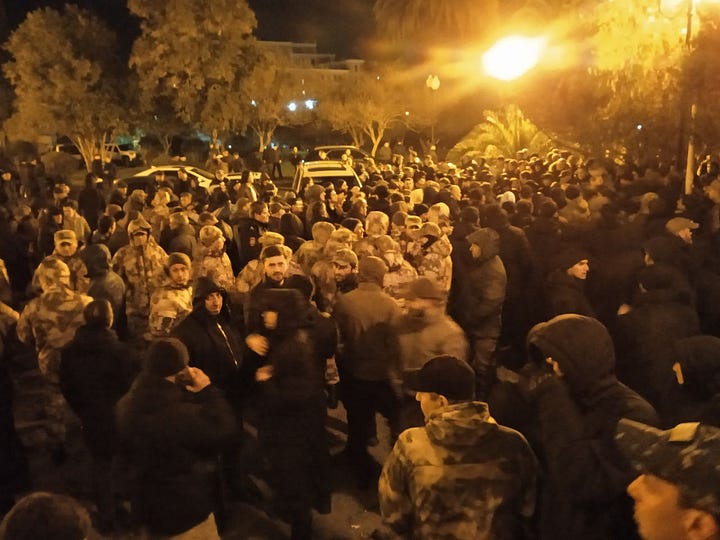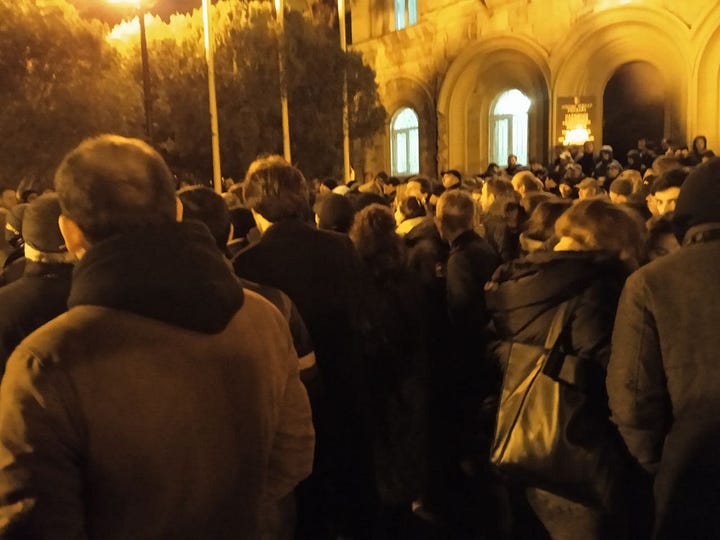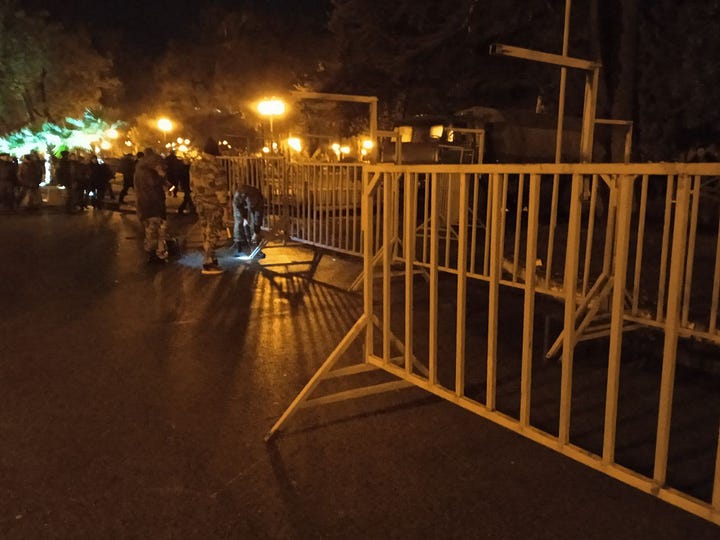Ongoing Protests in Abkhazia Over Pitsunda State Dacha Agreement
An indefinite protest outside the Abkhazian Parliament in Sukhum continues, with citizens united against the ratification of a contentious property agreement regarding the Pitsunda state dacha.
SUKHUM / AQW'A ― An indefinite protest has gripped the area outside the Abkhazian Parliament in Sukhum, as citizens come together in a steadfast demonstration against the ratification of a controversial property agreement involving the Pitsunda state dacha.
Alkhas Dzhindzholia, a former deputy and member of the 'Aamta' foundation, has confirmed the persistent and fervent nature of the protests. This demonstration marks a significant moment of civic engagement and opposition in the region, reflecting deep-seated concerns over national sovereignty and governance.
Representatives of various sectors of society, including civil society, intelligentsia, and political and public organisations, have convened at the Abkhazian Parliament to oppose the Pitsunda state dacha agreement, which they believe contradicts the Constitution of Abkhazia. The protesters, calling for widespread support, emphasise the peaceful nature of their action.




"The youth movement 'ҲараҲПицунда' ('Our Pitsunda') has echoed these sentiments, highlighting the critical nature of the protests and voicing strong criticism against the authorities for deploying military equipment in response. In their statement, the movement underscored the situation's urgency. 'Today, people are already gathering at the parliament. In response, the authorities are deploying military equipment, and barricades have become a symbol of the government's disregard for public opinion. We do not call for anyone to join us today, but should you deem it significant, we will be here. Tomorrow, all concerned citizens are urged to express their civic stance. This is crucial. December 27, at 9:00, 10:00, 11:00. Be there. Be in Pitsunda, be in Abkhazia, be present,' the statement implored.
In a recent development, the senior council of the 'Aiaaira' public organisation in Sukhum voiced strong criticism of President Aslan Bzhania's handling of the Pitsunda state dacha issue. War veterans and community members attending the meeting unanimously condemned the president's policies.
The debate over the Pitsunda state dacha agreement, scheduled for ratification on December 27th, has drawn widespread criticism. Abkhazia's General Prosecutor, Adgur Agrba, has appealed to citizens to avoid participating in unauthorised protests.
Aiaaira Organizes Rally on December 28th Over Pitsunda Dacha Issue
In a recent gathering of the 'Aiaaira' public organisation's senior council in Sukhum, a strong stance was taken against President Aslan Bzhania's handling of the Pitsunda state dacha issue. The meeting, which brought together war veterans, disabled individuals, and other community members, unanimously condemned the president's policies as detrimental to Abkhazia's interests.
Vianor Ashba, a prominent figure in the organisation, emphasised the severity of the situation. "The issue is about our very existence," he stated, reflecting the collective sentiment of the High Council members. The focus of their concern was the potential sale of significant properties in Abkhazia, with the Pitsunda state dacha being a case in point. This matter has stirred considerable unrest within the community, as it is seen as a threat to Abkhazia's sovereignty and governance.
Navigating Legal Complexities: An Analysis of the Pitsunda Agreement, by Said Gezerdaa
In a thought-provoking commentary shared on his Facebook page, Said Gezerdaa, a prominent lawyer at the Centre for Humanitarian Programmes in Sukhum, Abkhazia, delves into the legal and political complexities of the Pitsunda Agreement. Gezerdaa's analysis, originating from his social media platform, offers a critical perspective on the procedural nuances and the substantive legal challenges emerging from this pivotal case.
In the aftermath of a recent discussion at the Media Centre, the intertwining of lies and unprofessionalism is evident, particularly in the context of the Pitsunda Agreement. A striking instance was reported by the Parliament of Abkhazia’s Telegram channel, where it was announced that a coordinate error, crucial to the territory's demarcation for transfer to the Russian Federal Protective Service (FSO), was rectified through an exchange of notes (https://t.me/parliamentabkh/3164). However, this move raises legal questions, as neither Abkhazian nor Russian laws on international treaties permit amendments in the period between an agreement's signing and its ratification. This is specifically outlined in Article 28 of the Republic of Abkhazia's Law "On International Treaties."
The government, seemingly cornered, has resorted to a sly approach, referencing Article 79 of the Vienna Convention on the Law of Treaties (1969). Minister of Justice Anri Bartsits, during a roundtable on December 22, leaned on this article, suggesting a flexibility in correcting errors based on mutual consent (
His defense primarily relies on this article and a general theory of law, though this interpretation stretches beyond the doctrine's typical scope in international law.
The authority has issued a challenge to its people, and this challenge must be met! By Nizfa Arshba
In a period marked by escalating political strife, journalist Nizfa Arshba delves into the controversy that has enveloped the Abkhazian government's recent policy directions. The administration, headed by President Aslan Bzhania, has been met with staunch opposition from the public due to its proposed ratification of an agreement that would transfer the Pitsunda state dacha into Russian ownership. This pivotal issue has stirred national protests and has become a central point of contention, highlighting the profound concerns regarding national sovereignty and the current state of governance. The article, offering an in-depth perspective on these unfolding events, was originally published in Russian on aiashara.org.
From now on, the responsibility for the loss of the Pitsunda state dacha rests not with the president, but with the country's Parliament.
Our government's plan to rush through the law ratifying the Agreement on the state dacha in Pitsunda, right around the New Year’s table, is undeniably treacherous towards its people.
Fyodor Dostoevsky once wrote, "There are three kinds of scoundrels in the world: naive scoundrels, believing their villainy to be the highest nobility; scoundrels ashamed of their own villainy yet intent on carrying it through; and, finally, purebred scoundrels."
It seems we are facing the latter. The initiators of this disgraceful act seemingly hope that the people, who earnestly fought to keep the Pitsunda dacha within the Abkhaz populace, will be swayed by the base desires of New Year's indulgence, entertainment, and idleness. They judge others by their own standards, it seems.
"ҲараҲПицунда" Youth Movement Demands Apology from Abkhazian State Security Service
Anaid Gogoryan | Ekho Kavkaza ― Today, representatives of the "ҲараҲПицунда" (Our Pitsunda) youth movement held a press conference at the ARSMIRA venue. Invitations were extended to officials from the Abkhazian State Security Service (SGB). This conference was in response to remarks made by Zaala Khvartskia, the SGB’s Deputy Chairman, on AGTRK television on 22nd December. In his statement, Khvartskia accused representatives of Abkhazian civil society, including "ҲараҲПицунда" members, of undermining the nation’s political stability.
These comments from the SGB come against the backdrop of a tense political climate, stirred by a proposed bill concerning the transfer of a state datcha in Pitsunda to Russia. The bill, recently resubmitted for parliamentary ratification, faced opposition. On 20th December, various Abkhazian public and political organisations called on President Aslan Bzhania to retract the legislation. The following day, a gathering in Sukhum, which included civil society figures such as Arda Inal-ipa, Batal Kobakhia, and "ҲараҲПицунда" affiliates, openly opposed the agreement's ratification. Abkhazian media outlets report that a parliamentary session to deliberate on this matter is set for 28th December.
Reacting to the escalating involvement of civil society, the SGB, on the evening of 22nd December, broadcast a statement on Abkhazian television. It spoke of "efforts by certain elements within the country, including NGO representatives, to disrupt the political equilibrium." Deputy Chairman Khvartskia remarked that presently, 23 non-governmental organisations and 10 international organisation offices are operational within Abkhazia. From January 2020 to November 2023, these entities have amassed around 2 billion 90 million rubles in foreign funding. He particularly underscored the role of the UNDP, a key international organisation in Abkhazia, predominantly supported by the USAID.






